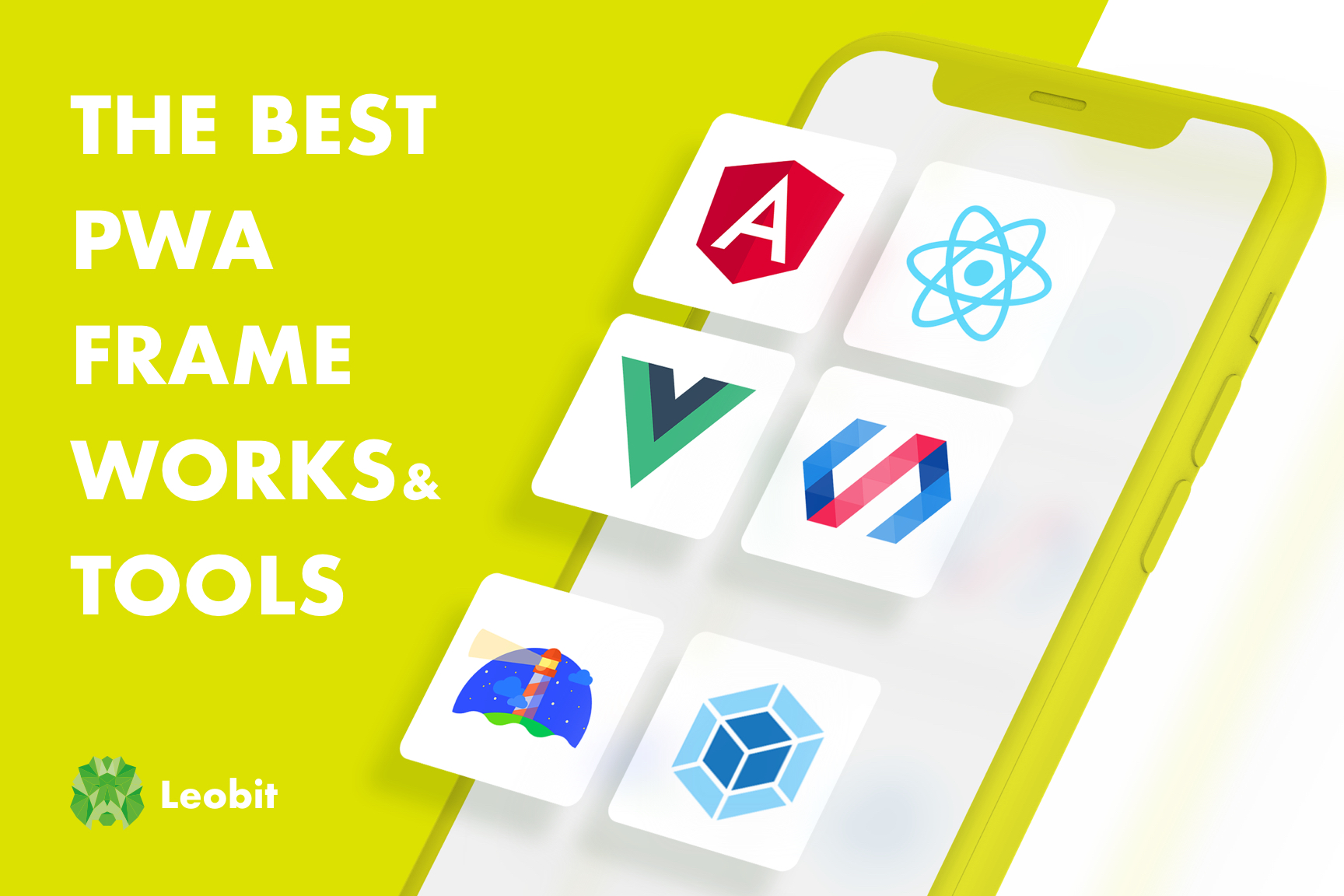Progressive web applications (PWAs) make use of the best technical solutions applied in mobile and web applications. The concept of PWA was introduced in 2015, enabling programmers to deliver web-based applications that are competitive and even outperform the native app’s user experience. Keep reading and you will learn:
- What is a progressive web application?
- Why should you develop a progressive web application?
- Overview of the web frameworks and tools to build a progressive web app
What is a Progressive Web Application?
A Progressive Web Application is a website developed with the help of web technologies, but it performs like a native application. The usage of specific techniques for PWA development makes the mobile customer experience much more pleasant than a standard mobile-optimized site.
The main characteristics of PWA are:
- Responsiveness. The User Interface design of progressive web applications is very adaptable and optimized for any type of device, screen size, and resolution.
- App-like experience. PWAs are easy to use on mobile devices because they don’t feel like websites but rather remind the user of native apps with clear navigation and interactions.
- Connectivity-independence. Progressive Web Apps use device storage, which is why they are accessible offline or in areas with slow internet.
- Easy installation. There is no need to go through the process of downloading and installing another application as users can simply choose the option of adding a PWA icon to the home screens of their gadgets once they open the PWA powered site.
- Re-engagement. PWA push notifications keep users involved and help them go back to the application after its installation.
- Discoverability. As PWAs are websites, search engines can discover, index, and rank them effortlessly.
- Self-updating. Internet connection is the only condition for PWAs so they can update themselves automatically. Users will always have the latest version without the necessity for manual updates.
- Safety. PWAs use Hypertext Transfer Protocol Secure (HTTPS) that protects data and content from unauthorized access.

Why Should You Develop the Progressive Web Application?
The advantages of progressive web applications that arise from their characteristics are not the only strengths of PWAs. Progressive web apps can also bring significant benefits for business owners like:
Cross-platform
PWAs are not limited by any specific platform. They can work on almost any device, including desktops and mobiles. In turn, this simplifies the overall development process, as developers don’t need to make separate versions of the app for multiple platforms.
Cost-effective
Building a progressive web application is cheaper than building a native one. This benefit follows from the previous one. Developers don’t have to create content separately for iOS, Android, and a website, it can be produced just once. The self-updating feature of PWAs also saves money for app maintenance.
Fast
PWAs guarantee smooth performance and provide quick responses to user interactions. They can pre-load content and keep it on the users’ devices while they browse. As a result, it leads to almost instant loading speed since the content is already there once the page is opened.
Reliable
Besides instant loads mentioned above, PWAs also use less data compared to a native app. Poor internet connection does not affect user experience, as progressive web apps use application caching to provide customers with relevant content in such cases.

Examples of PWA
Many businesses across a variety of industries understood the importance of progressive web apps in molding the future of the web and decided to implement PWA technologies and make use of their benefits. Here are just a few examples of popular brands that utilize PWAs to improve the performance of their applications.
AliExpress PWA. Thanks to the new mobile experience, one of the most prominent global e-commerce platforms achieved fantastic numbers:
- 104% conversion rate for new users across all browsers
- 82% increase in iOS conversion rate
- 2X more pages visited per session per user across all browsers
Forbes PWA. In 2017, a popular American business magazine decided to relaunch its mobile experience as a progressive web app. Fast page loads, push notifications, and instant transitions resulted in higher user engagement and increased conversions.
Telegram PWA. Telegram managed to take its position among popular web apps despite the fact that it’s a mobile chat service. Telegram PWA brings lightning-fast experience, not conceding before native applications.
Uber PWA. A multinational ride-sharing app brings the native experience in a lightweight progressive web application that can load in under 3 seconds on 2G and fulfill ride requests regardless of network speed.
Overview of the Web Frameworks and Tools to Build Progressive Web App
Regardless of whether you decide to develop progressive web applications in-house or involve a progressive application development company, we compiled a list of the best progressive web app frameworks and tools that will be helpful in building such an application.

Angular
In 2009, Angular was introduced by Google. It is the most popular framework for PWAs. It makes use of TypeScript to create reliable, responsive, and robust applications. One of the recent versions introduced the new Service Worker feature, which played a big role in improving the inbuilt support of the framework. Because of this, developers do not need to have a high level of expertise to build an effective PWA.
Benefits of Angular
- The methodology is defined clearly hence the easy implementation
- The learning process of the framework has been shortened due to many official guides and readymade solutions
- It includes Typescript and IntelliSense
- Google backs it hence an excellent support
- It gives an opportunity to use Angular Universal technology for PWA rendering
Disadvantages of Angular
- To use the framework you need to learn Typescript
- It is quite complex
React
React is a popular and highly effective PWA framework supported by Facebook. It has an extensive JavaScript library, that’s why it’s so famous among developers. This PWA framework links with HTML structures using JSX or TSX. There are various packages that one can use to scale up a project or app.
Benefits of React
- Pervasive ecosystem
- There is smooth support and operation since Facebook maintains the code
- Ability to create flexible and scalable apps
- The code used in React web apps can also be used in native apps
- Virtual-DOM makes the rendering process fast
Disadvantages of React
- It is complex and only a programmer with knowledge of JSX or TSX can use it
- More issues will pop up if you seek flexibility
Vue
Vue is newer than React or Angular, but it is still a great framework to build progressive web apps. It has the fastest-growing libraries of any framework. It has cracked the code by delivering two valuable things – simple coding and high speed. It’s easy to scale up the app by using additional packages in Vue.
Benefits of Vue
- Alibaba and Laravel support the framework
- It has a simple code, making it easier for new developers to use it
- This framework is simple and has similar features to that of Angular and React
Disadvantages of Vue
- A tiny support team since the framework is owned by one person and not a company
- The flexibility advantage creates issues when used
Polymer
Polymer framework is open-source as well. It has a wide variety of web components, tools, and templates. As a result, simplified operations make it a preferred choice for PWA development.
The components and tools within the framework are supported by many browsers. That’s why the application created with the help of the Polymer framework is highly accessible and adaptable. It is also an independent framework because it uses pure CSS, HTML, or JavaScript.
Benefits of Polymer
- It has full support, including data tier, responsive layouts, and routing
- An easy to understand API
- The embedded development tools make the use of debugging tools needless
Disadvantage of Polymer
- Not SEO friendly
- Requires some extra effort to make it look the same on different browsers
Lighthouse PWA Analytics Tool
Lighthouse is an automated open-source tool used to improve web page quality. It can be run on any webpage – requiring authentication or public. It has audits for accessibility, performance, SEO, progressive web apps, and more.
When Lighthouse audits a URL, it runs audits on the web page and generates a report on the success of the page. Then use the failing audits and ideas to improve the page. Each audit contains a reference document explaining the importance of the audit and how to fix identified issues as well.
Lighthouse CI comes in handy to prevent website regressions.
Pros
- Saves your history
- Offers live preview states
- Even after removing the builder, the changes are saved
Cons
- More time is spent in tweaking designs unlike coding them yourself
Webpack Module Bundler
This is a powerful and aggressive module bundler for JavaScript apps. It packages the modules in your application into one or more bundles and serves them to the browser. With the help of plugins or loaders, it can optimize, transform, or minify all file types before serving them as one bundle to the browser. It takes in different assets like CSS, JavaScript, Images, Fonts, and HTML and transforms them into a convenient format consumable through a browser.
Pros
- Most powerful bundler
- Webpack encore
- Easy configuration
- Laravel mix
- Can handle all asset types
Cons
- Over-engineered
Contact us to share your project vision and we will deliver a top-notch solution that best fits your needs.
Conclusion
Progressive web applications are quickly becoming an integral technology in the IT world that is already challenging native applications. Merging the best of mobile and web undeniably makes the application more convenient for the users.
Would you like to know how to build a progressive web application from scratch or are you planning to convert your existing application into one? We recommend you outsource your application development to a reliable company that has extensive experience in web and mobile app development services.













